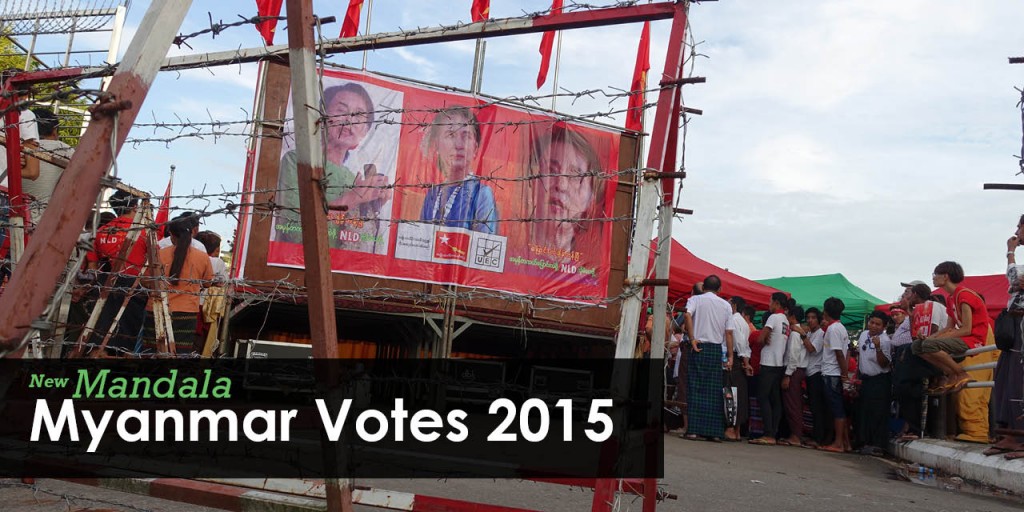
Could Myanmar’s post-election transfer of power derail democracy? Chit Win surveys the risks.
If you thought that a new legislature, or Hluttaw, will be convened after Myanmar’s election on 8 November, then you got it wrong.
Unlike other elections, the old folks will still be running the show even after the big event.
The current legislature is set to expire on 30 January 2016. Last week, the Hluttaw announced that its 13th plenary session will be convened on 16 November, eight days after the election.
Presumably by then everyone will know who has won the election. Undoubtedly, the results will affect the politics inside the legislature.
When the Hluttaw meets in November, there will be obvious winners and losers among the nation’s current lawmakers. The winners will be congratulating each other, although reports suggest that it is not likely to be many from the current crop.
The new batch of elected representatives will be busy observing the legislative sessions with great enthusiasm, keenly observing the work of those they are set to replace.
The losers will console each other quietly. But remember, they are still in charge and most importantly what happens between 16 November and 30 January will shape the direction of a new Myanmar for better or for worse. This is the most crucial time for Myanmar’s transition.
In this context, there are two pressing issues for the post-election legislative session: political bargaining to elect the next President, and planning for a smooth succession.
The first issue is all about who gets to rule the country.
In Myanmar, the winning party in an election is not guaranteed to become the ruling party. In order to get a majority in the legislature, a party needs to garner more than 332 or two-thirds of the elected seats in the legislature.
This is because 25 per cent of seats are reserved for the military. Even if a party does reach this threshold, the military will still be able to constitutionally nominate its preferred candidate as Vice-President.
It will be difficult for the opposition National League for Democracy (NLD) to get a two-third majority in the election because, aside from the current ruling Union Solidarity and Development Party (USDP), numerous minor and ethnic parties are concentrating on a few constituencies where they think they will perform well.
Should the NLD fail to secure the super majority in the legislature, the next session of the legislature will see major political bargaining, with the military, minor and ethnic parties playing the role of kingmakers. The new legislature inaugurated in January 2016 will simply endorse whatever deal is struck.
The second issue is that the post-election legislative session in Myanmar must work to ensure a smooth transition process.
When the current legislature was established on 30 January 2011, it took almost two months for the President-elect to take charge of the country, in line with the new budget cycle which starts on 1 April.
It is quite likely that the incumbent President will hand over the presidency on 31 March 2016 with a budget prepared by the old administration and approved by the new legislature.
If the next ruling party is the USDP, backed by the military, it will have no problem in following this precedent. But it would be contentious if the NLD becomes the ruling party.
The old legislature may be tempted to exploit the remaining 11 weeks promulgating a series of important and controversial laws before it transfers to the new legislature. For instance, the military regime promulgated a series of laws to safeguard the military’s interest just three days before the election in 2010.
In that sense, a lot can happen between when the legislature convenes after the election and next year when its term comes to an end. This is dangerous and can take Myanmar down a dangerous path.
The President has guaranteed that power will be transferred peacefully to any party including the NLD. But there is no guarantee how the legislature will take it.
At the closing day of the 12th plenary session of the union legislature, the Speaker Thura Shwe Mann said that the legislature had 45 pending bills most of them politically non-sensitive.
While it is understandable that the transitional legislature in Myanmar has a long list of bills, it should not misuse the remaining time enacting important laws that can have profound influence.
Instead it should maintain the forward-looking stance it has been credited with over the last five years, and pave the way for a better Myanmar.
Ultimately though, what Myanmar vitally needs is a legislation on power transfer that will reduce anxieties and ambiguities surrounding the transition.
In the meantime, the stakes have never been higher.
Chit Win is a PhD student at the Coral Bell School of Asia Pacific Affairs at The Australian National University. His research focuses on the role of the legislature in Myanmar’s nascent transition.
This article forms part of New Mandala’s ‘Myanmar and the vote‘ series.
 Facebook
Facebook  Twitter
Twitter  Soundcloud
Soundcloud  Youtube
Youtube  Rss
Rss 